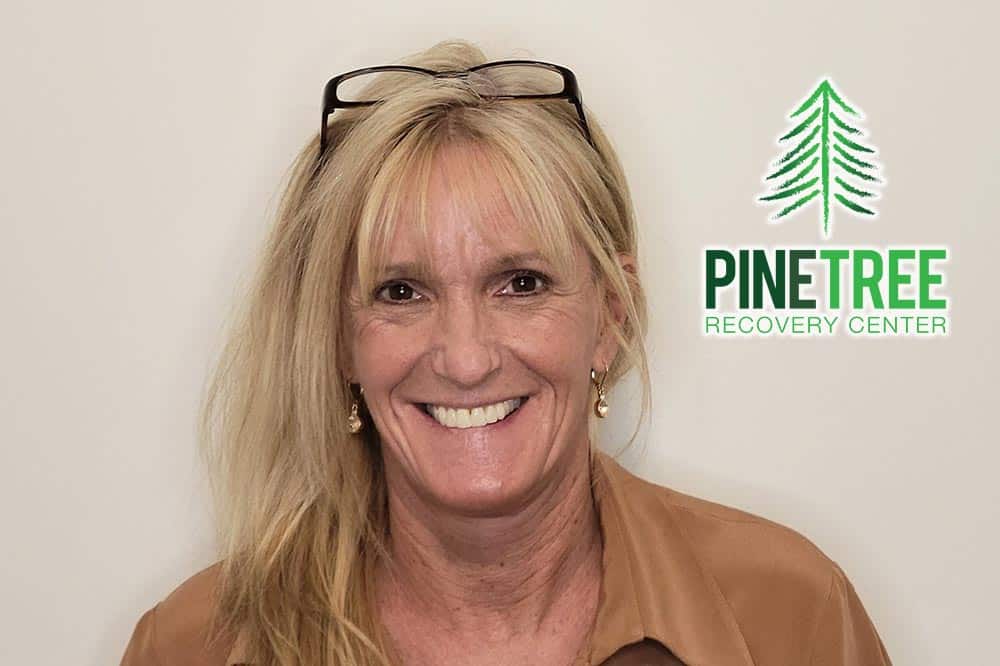Nothing about navigating a substance use disorder is easy, but accepting that you or a loved one has a substance use disorder and needs professional help can be one of the most difficult revelations of your life. Not understanding what to expect can be a significant barrier to entering treatment — but don’t let fear of the unknown keep you from taking this life-affirming step. While everyone has different needs for addressing addiction and dependency, all reputable facilities offer similar processes that can be customized for you.
If you or someone you care about is struggling with a substance use disorder, PineTree Recovery Center can help. Our experienced, compassionate team will work with you to develop an individualized and effective program to help you recover from addiction and get on the road to long-term recovery. We believe in the benefits of a full curriculum of clinical care, beginning with medical detoxification, transitioning into a higher level of treatment, and concluding with personalized aftercare planning. Contact us today to learn more about our treatment options in your area.
What Is Drug Rehab?
Rehab is a process or program designed to help you overcome dependency on drugs or alcohol. Rehab is carefully structured to provide you with the best chance of learning to manage your disorder and sustain recovery long-term. The best facilities offer a wide variety of programs that can be tailored to meet your needs.
Understanding the Addiction Treatment & Recovery Journey
There is a reason that recovery is considered a journey. You are never “done” overcoming an addiction. It takes continual action to maintain sobriety. Regularly attending 12-Step and other support meetings, practicing coping skills, maintaining a healthy diet, and engaging in regular exercise are all necessary to sustain your recovery.
Starting this journey can feel intimidating, but it doesn’t have to be. Understanding what to expect during drug rehab will help ensure your experience is as stress-free and successful as possible.
Your recovery journey will last your lifetime, and there may be rocky patches. Using the tools and skills you develop during treatment will help you avoid relapse and sustain long-term recovery.
We Are Here For You
Initial Evaluation & Assessment
The initial assessment includes gathering information on your substance use history, mental health status, any pre-existing physical conditions or psychiatric issues, environmental influences, family history of addiction, and the level of support available in your life. These in-depth discussions will allow the clinical professionals who conduct them to understand your situation fully.
It’s essential to be completely honest and forthcoming during your assessment so your treatment team can help develop the most effective treatment plan for you. They will not judge you or criticize you when you tell them what you have done. They are there to help you.
Inpatient Residential or Outpatient Care
During your assessment, you will discuss whether inpatient residential or outpatient treatment is best for you.
Inpatient residential care requires you to remain within the facility for a predetermined period, usually anywhere from 28 to 60 days, but the length of stay varies from person to person. This type of treatment provides 24-hour access to professional medical care and support services and allows individuals to stay away from potential triggers while focusing solely on their recovery.
Outpatient programs offer more flexibility. They allow individuals to participate in drug rehab while continuing their daily lives. Clients have access to therapy sessions and educational classes during this treatment.
Our Drug & Alcohol Detox Services Include
Detoxification Protocols
Detoxification —allowing your body to cleanse itself of drugs and alcohol — is essential to drug rehab treatment and occurs within the first few days of entering a program. This phase involves managing withdrawal symptoms and cravings associated with your addiction while preventing further damage to your physical health.
Detox protocols vary depending on the type of substance you use and are carefully monitored by medical staff to ensure safety and comfort during this process. Many programs offer medical detox, which eases withdrawal symptoms in a safe, supervised environment.
Medication Management & Detox
In some cases, medications that inhibit the yearning for drugs may be prescribed as part of an ongoing treatment throughout rehabilitation and beyond. These medications can help you manage your addiction by reducing cravings, making it easier to stay away from drugs while focusing on recovery outside the facility.
Medication Assisted Treatment (MAT) is not a cure-all for addiction. The Substance Abuse and Mental Health Administration (SAMSA) confirms that MAT is only effective as a treatment for addiction when combined with intensive behavioral therapy.
Counseling & Therapy Sessions
Counseling and therapy sessions are critical to any successful drug rehab treatment plan. During these sessions, you can explore their addiction and learn more effective coping strategies to manage cravings and triggers when confronted with them in the outside world.
Individual counseling may include:
- Cognitive Behavioral Therapy (CBT).
- Trauma therapy.
- Dialectical Behavior Therapy (DBT).
These sessions allow you to gain insight into yourself while establishing community within the group. By taking advantage of these services during drug rehab, you can build the skills and knowledge necessary to stay clean and embrace a healthier lifestyle.
Group Support Sessions
Group support sessions are another integral component of drug rehab treatment programs. During these sessions, individuals can come together in a safe and supportive environment to share their experiences and learn from each other.
Group therapy allows you to connect with peers who understand the challenges of addiction and recovery, allowing you to gain insight into yourself while receiving feedback from those who have gone through similar struggles. Group members can also provide emotional support to one another, which is essential for maintaining sobriety in the long term.
Ready To Begin Your Drug & Alcohol Detox?
We Offer A Safe & Effective Program
Don’t let Drug & Alcohol addiction control your life.
Call us today and let’s get you started on the path to a better you.
Family Involvement
Having the support of a loving and understanding family can be essential for your recovery journey.
In addition to giving moral support, families can participate in family therapy sessions to learn more about addiction and how to help you throughout recovery. These sessions allow families to explore relationship dynamics, discuss communication strategies, and address any unresolved issues that may have contributed to the addiction.
By involving families in the drug rehab treatment process, individuals can better prepare themselves for success in their recovery journey.
Aftercare Planning
Once a person has completed their drug rehab treatment program, continuing aftercare support is essential for maintaining sobriety in the long term. Aftercare typically consists of follow-up appointments with counselors and therapists, medication management, and/or 12-step programs. Aftercare planning can include sober living housing and intensive outpatient and outpatient programs.
Overall, long-term aftercare is essential for anyone undergoing drug rehab treatment. You can achieve your recovery goals and lead a healthier life with the right tools and resources.
Nutritional Guidance
Eating a healthy and balanced diet can be essential for managing the physical side effects of withdrawal and ensuring you have the necessary energy to participate in your recovery journey.
During this time, nutrition experts may advise on how to eat right and recommend specific foods or dietary supplements that will give you the nutrients you need to stay strong. Additionally, nutritional guidance helps you develop healthier eating habits that you can maintain even after treatment.
Holistic Approaches to Treatment
To effectively manage substance use disorder, individuals need a comprehensive approach that addresses all aspects of their physical, mental, and emotional health.
These treatments may include yoga or meditation sessions that focus on calming the mind and body, relaxation techniques that help reduce stress levels or alternative therapies such as art therapy which can help you explore the underlying causes of addiction. Combining conventional treatment plans with holistic approaches can ensure you have all the support and resources necessary to recover from an addiction fully.
Relapse Prevention Strategies
After you have gone through the detoxification process and completed the rehabilitation program, it is important to understand how to prevent relapse to maintain long-term sobriety.
These strategies may include identifying triggers and warning signs of a potential relapse, developing coping mechanisms to manage cravings or stress, and seeking social support networks to offer guidance and comfort during difficult times. Be sure to have an emergency plan in place so you know what steps to take if you feel like you might be on the verge of a relapse.
Achieving Long-Term Sobriety
You can achieve long-term sobriety by developing and sticking to a multi-faceted recovery program that includes components that support your emotional, physical, and mental health. Straying from that program is not a moral failing; it’s often just a part of life.
Addiction is a chronic condition that involves changing deeply-rooted behaviors. Relapse does not mean treatment has failed or you cannot sustain recovery. Returning to your program and getting the help you need as quickly as possible is key to regaining your sobriety. Using the lessons you learned will support your ongoing recovery.
Begin Healing Now!
Have A Call With One Of Our Treatment Advisors
Don’t Suffer Any Longer
Contact Us Today
Admitting you have a substance abuse issue and deciding to enter rehab are difficult but important decisions that will positively affect your life and the lives of those around you. But it can be hard to make that leap if you don’t understand what to expect from a rehab program. No matter the substance, the best way to overcome addiction is with the help of experienced, trusted professionals like those at PineTree Recovery Center. We provide comprehensive treatment, including medically-assisted detox, therapy, specialty programs, and reintegration support. Our caring and skilled administrative, medical, and clinical teams will guide you through every step of your recovery process from the first time you call. We provide a complimentary assessment and a free insurance benefits check and help coordinate local travel to our facility. All you have to do is ask; we will take care of the rest. Contact us today.

Reviewed for accuracy by:
Randi Bruneau
LCSW, LADC, CCS
Randi is a Licensed Clinical Social Worker and Licensed Alcohol and Drug Counselor and Supervisor who has over 20 years of experience in the field of mental health and addictions. She has worked in both clinical and administrative leadership roles and also has extensive career experience in gender specific trauma treatment, crisis intervention, structural family work and substance use disorder treatment and supervision.























